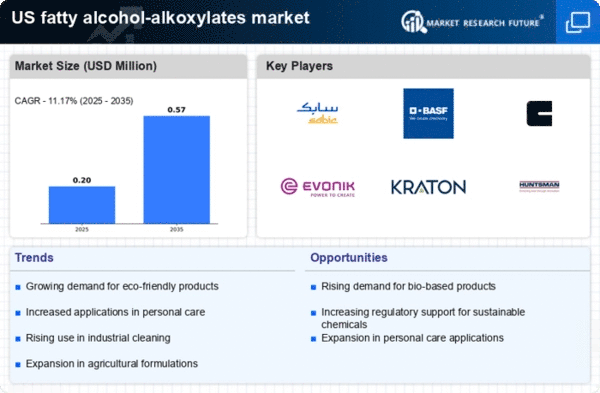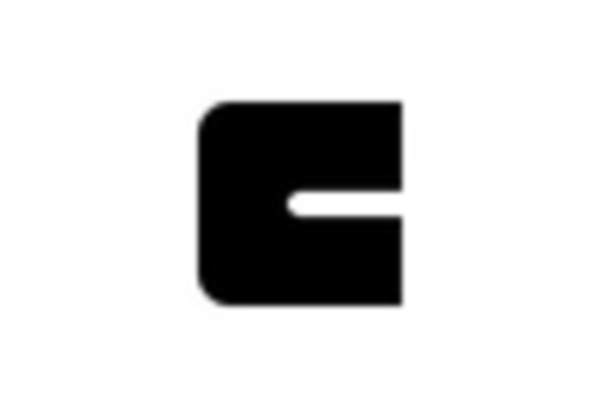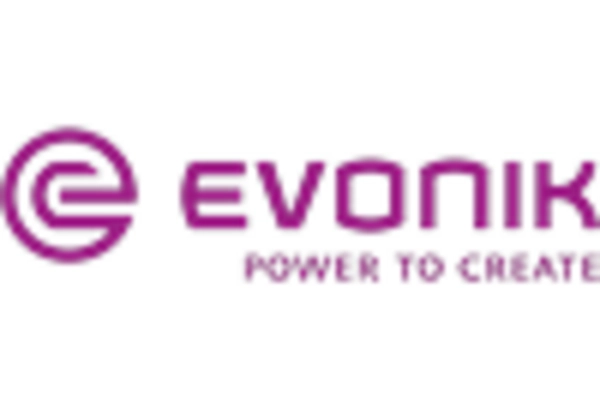Growth in the Personal Care Sector
The personal care industry is experiencing robust growth, which is positively influencing the fatty alcohol-alkoxylates market. With an increasing focus on high-quality and effective personal care products, manufacturers are incorporating fatty alcohol-alkoxylates for their emulsifying and surfactant properties. The market for personal care products is expected to grow at a CAGR of around 4.5% through 2027, creating substantial opportunities for fatty alcohol-alkoxylates. This growth is driven by changing consumer preferences towards natural and organic ingredients, prompting brands to reformulate their products. Consequently, the fatty alcohol-alkoxylates market is likely to benefit from this trend, as these compounds are perceived as safe and effective alternatives in personal care formulations.
Rising Demand for Eco-Friendly Products
The increasing consumer preference for eco-friendly and sustainable products is driving the fatty alcohol-alkoxylates market. As consumers become more environmentally conscious, manufacturers are compelled to develop products that align with these values. This shift is evident in various sectors, including personal care and household cleaning, where fatty alcohol-alkoxylates are favored for their biodegradable properties. The market is projected to grow at a CAGR of approximately 5.2% from 2025 to 2030, reflecting the rising demand for sustainable alternatives. Companies are investing in research and development to enhance the performance of fatty alcohol-alkoxylates while maintaining their eco-friendly attributes. This trend not only supports environmental goals but also opens new avenues for market expansion, as consumers increasingly seek products that minimize their ecological footprint.
Technological Advancements in Production
Technological innovations in the production processes of fatty alcohol-alkoxylates are significantly impacting the market. Advanced manufacturing techniques, such as enzymatic processes and green chemistry, are enhancing the efficiency and sustainability of production. These advancements allow for the reduction of waste and energy consumption, which is crucial in meeting regulatory standards and consumer expectations. The fatty alcohol-alkoxylates market is witnessing a shift towards more efficient production methods, which could potentially lower costs and improve product quality. As a result, manufacturers are likely to gain a competitive edge by adopting these technologies, thereby driving market growth. The integration of automation and digitalization in production processes further streamlines operations, contributing to the overall expansion of the fatty alcohol-alkoxylates market.
Expanding Applications in Various Industries
The versatility of fatty alcohol-alkoxylates is leading to their expanding applications across multiple industries, including cosmetics, textiles, and agriculture. In the personal care sector, these compounds are utilized as emulsifiers and surfactants, enhancing product performance and consumer appeal. The fatty alcohol-alkoxylates market is projected to reach a valuation of $1.5 billion by 2027, driven by the increasing adoption of these compounds in formulations. Additionally, their use in agricultural products as adjuvants is gaining traction, as they improve the efficacy of pesticides and herbicides. This broadening scope of applications not only fuels demand but also encourages innovation in product formulations, thereby propelling the growth of the fatty alcohol-alkoxylates market.
Regulatory Support for Biodegradable Products
Regulatory frameworks in the US are increasingly favoring biodegradable and environmentally friendly products, which is beneficial for the fatty alcohol-alkoxylates market. Agencies are implementing stricter regulations on chemical substances, promoting the use of safer and more sustainable alternatives. This regulatory support encourages manufacturers to invest in the development of fatty alcohol-alkoxylates that comply with these standards. As a result, the market is likely to experience growth as companies align their product offerings with regulatory expectations. The emphasis on sustainability in regulations not only enhances consumer trust but also drives innovation in the fatty alcohol-alkoxylates market, as businesses seek to create compliant and effective products.

















